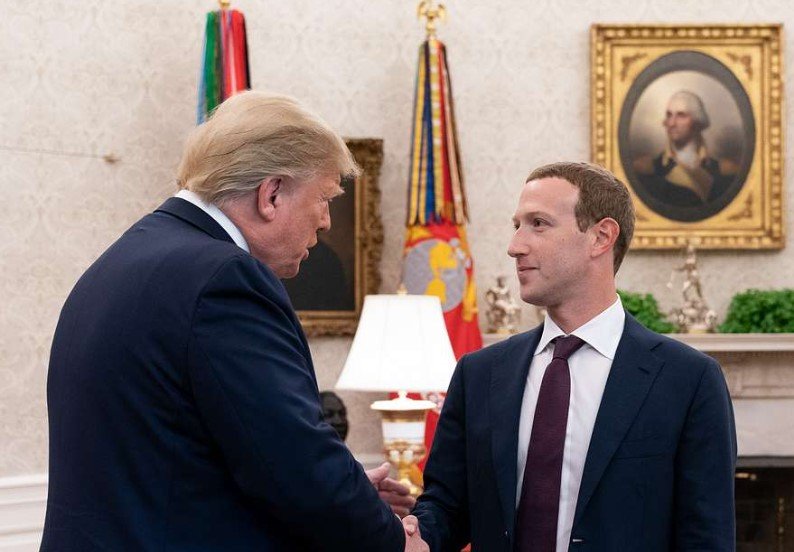Survey reveals deep distrust as Zuckerberg tops the ‘most unlikeable’ list among conservatives
Big Tech’s efforts to win favor in Trump’s Washington are falling flat with the people who helped put him there. A new nationwide poll reveals that most Trump voters see recent outreach from tech titans like Meta’s Mark Zuckerberg as more manipulative than sincere — and they’re not shy about saying it.
In fact, Zuckerberg, the man behind Facebook, now holds the dubious title of most “unlikeable” tech CEO among conservative voters, with a whopping 63% giving him a thumbs down. And he’s not alone in facing public backlash.
Political Theater or Corporate Strategy?
When tech CEOs started showing up at President Trump’s inauguration earlier this year, critics raised their eyebrows. After years of being accused of silencing conservative voices online, platforms like Meta and X (formerly Twitter) were suddenly going quiet on fact-checking, rolling out red carpets in D.C., and even tossing praise Trump’s way.
But the show didn’t work. At least not with most of Trump’s base.
According to a survey conducted by the Tech Oversight Project and Public Policy Polling, 54% of Trump voters believe the sudden friendliness is nothing more than a tactical move. They suspect it’s all aimed at influencing Trump on policies that directly affect Big Tech’s business interests.
And they’re not alone. Across the political spectrum, 70% of respondents echoed the same concern: tech firms are playing politics to gain ground.
It’s not that surprising when you think about it. Americans have been growing wary of Silicon Valley for years — from privacy scandals to political meddling.

Zuckerberg Leads the List of Least Trusted Tech CEOs
If Zuckerberg was hoping to shake off his image problem with a D.C. makeover, it didn’t work. Not even close.
Here’s how the major players stack up when it comes to trust among Trump voters:
-
Mark Zuckerberg (Meta): 63% find him unlikeable
-
Jeff Bezos (Amazon): 53% unfavorable rating
-
Sundar Pichai (Google): 52% disliked
-
Tim Cook (Apple): 44% viewed negatively
-
Sam Altman (OpenAI): 34% disapproval
Among the general voting population, the numbers get even worse. A full 74% of all voters find Zuckerberg untrustworthy. Bezos isn’t far behind with 67%. Pichai’s rating climbs to 55%, while even Altman — who’s newer to the public eye — is distrusted by half the voters.
That’s not just a popularity problem. That’s a credibility crisis.
A Trust Gap on AI Policy and Oversight
There’s a growing divide between Silicon Valley and the American public — and nowhere is it clearer than on the topic of artificial intelligence.
While companies like Meta, OpenAI, and Google continue to tout their leadership on AI, the American public seems unimpressed. Just 7% of respondents said they trust Big Tech CEOs to make decisions about AI policy.
In contrast, 52% of those surveyed said they would rather see state and federal governments take the reins.
That stat cuts deep. For an industry that prides itself on being ahead of the curve, it seems voters are increasingly saying: “Thanks, but no thanks.”
Clearly, people want a check on tech — and they don’t think the industry can regulate itself.
The Politics Behind the Pivot
After years of bruising headlines — from Cambridge Analytica to election misinformation — Big Tech leaders seemed eager to hit the reset button when Trump reclaimed the White House.
Meta quietly pulled back on its fact-checking program. Elon Musk, who now controls X, started reinstating accounts that had been previously banned. And reports of tech bosses cozying up to administration officials began circulating faster than ever.
But Trump supporters aren’t easily swayed. Many view the pivot as performative.
One single-sentence insight from the poll: Only 9% of Trump voters believe Big Tech is trying to be more fair.
A Growing Appetite for Accountability
While many Trump voters may distrust Big Tech’s motives, they’re not just shrugging and moving on. In fact, there’s rising support for concrete policy action to rein in corporate overreach.
Sacha Haworth, executive director of the Tech Oversight Project, summed it up bluntly: “Even Trump voters reject their new MAGA act – and in fact support policies like a Big Tech Tax.”
This isn’t just a fringe idea anymore. The poll found support for:
-
Increased federal regulation of social media algorithms
-
Mandatory transparency in content moderation policies
-
A federal “Big Tech Tax” aimed at funding online consumer protection
People don’t want just more hearings and hand-wringing. They want rules — and penalties when they’re broken.
Can Big Tech Rebuild Trust?
It’s a tough road ahead for tech firms hoping to repair their relationship with the public. For conservatives especially, the skepticism runs deep — and it won’t be reversed with an Oval Office visit or a photo op.
One sentence that stood out: Only 4% of Trump voters said they trust Meta to protect free speech.
That’s devastating for a company that built its brand on “connecting the world.”
And with 2026 midterms around the corner, the political winds are shifting fast. Tech CEOs may have to do more than just change their public tone — they may need to change how they operate entirely.








